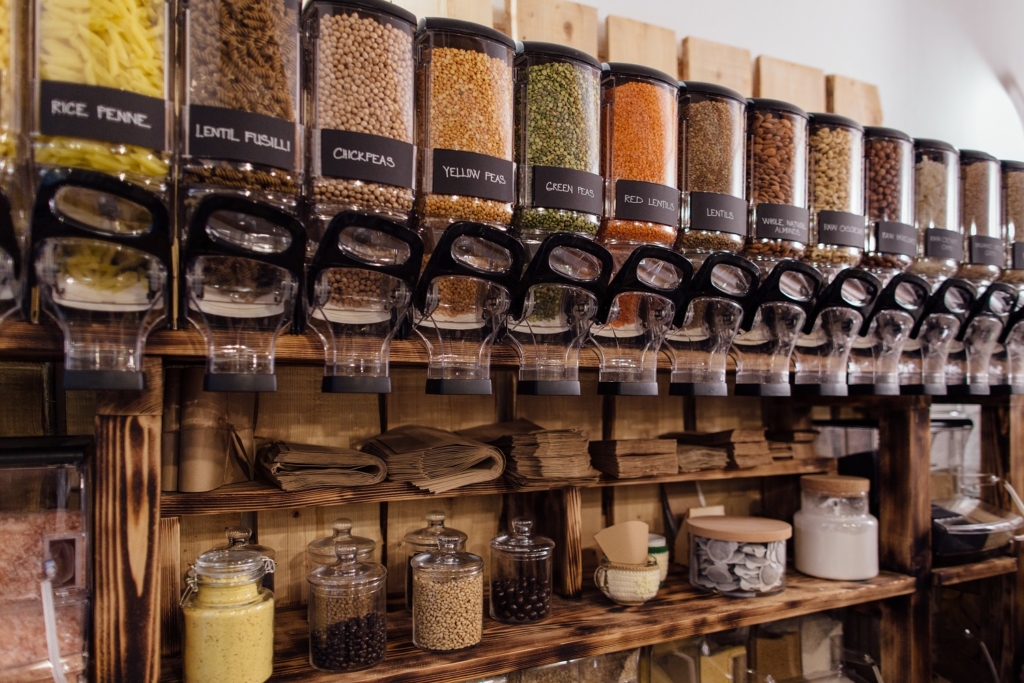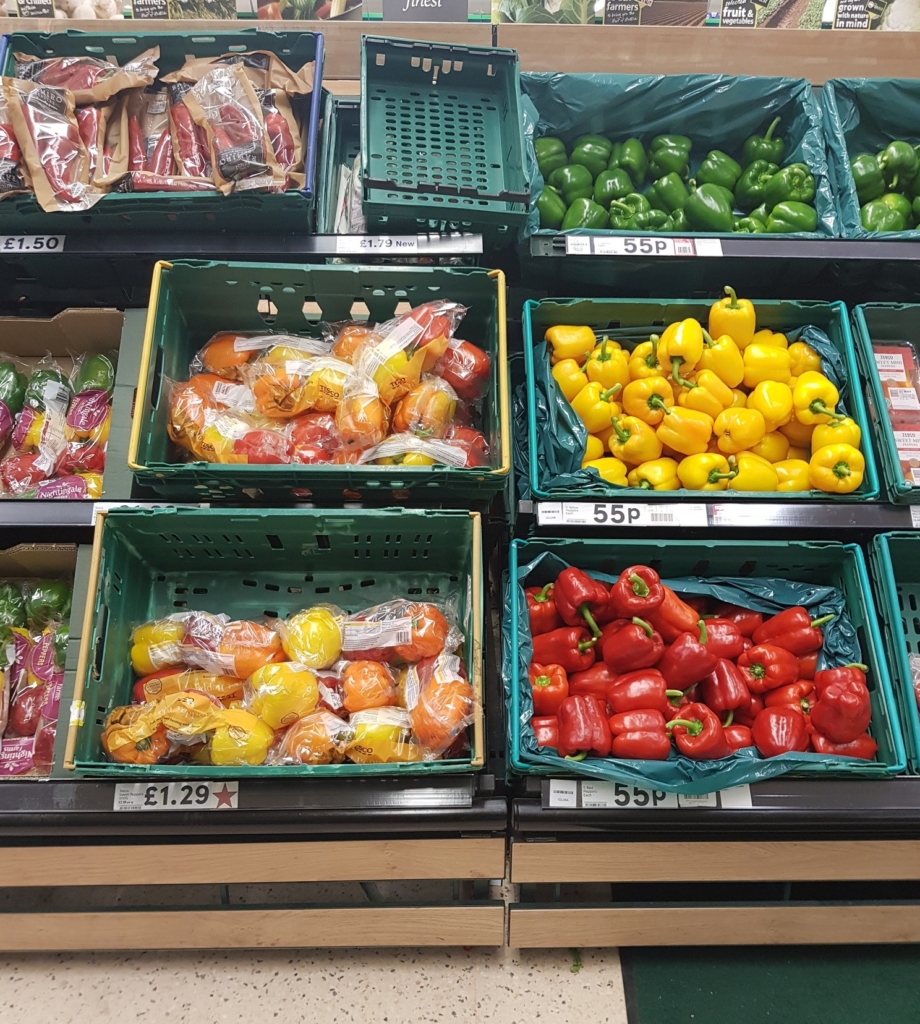The rise of refill shops – a trend, or the new way to shop?
Zero-waste and refill shopping is on the rise everywhere you look. Little shops are starting to pop up on high streets that weren’t there before and even your local businesses are starting to fill their shelves with glass jars of nuts, dried fruit, grains, and shampoo. But like always, there are multiple factors to consider when discussing sustainability so let’s delve into the rise of refill shops: are they just a trend or are they the new way to shop?
What are refill shops?
Refill shops tend to be small, independent stores that sell non-packaged food requiring shoppers to BYO containers; most of the time it will be dry goods like pasta, rice, oats, spices, nuts, cereals, and oils but occasionally they also provide locally sourced produce. They can also sell many other sustainable products, like refill cleaning products, soaps, and homewares.

This shopping experience has popularised in the last couple of years: a quick look on Instagram shows that #zerowaste has 6.7 million posts. A 2019 Greenpeace report found more than 400 shops had emerged worldwide, plus crowdfunding campaigns and online stores. Greenpeace call this new way of shopping ‘the old new’ because they resemble old neighbourhood shops. Let’s not forget that not so long ago pre-1950s, wasting anything was frowned upon. For the average person, they ate whatever they could afford and mended everything they owned. But unlike the olden days, social media is apparently key for refill shops to reach and grow their audience.
Although small, these independent shops are powerful. Their emergence and the zero-waste movement online has forced supermarkets to adapt. Waitrose began it’s ‘Unpacked’ campaign in June 2019 where customers can choose from 200 lines of plastic free food and bring empty containers to fill. Sainsbury’s and M&S have followed suit this year by introducing refill stations after discovering that 75% of their customers were consciously trying to reduce plastic when shopping.
In theory, these shops sound perfect and they’re clearly making a difference. But what’s really going on?
How much waste do they reduce?
Supermarkets put over 900,000 tonnes of plastic packaging on their shelves each year! We’ve all brought items home and wondered why on earth it has three plastic sleeves. So refill shops are one opportunity to reduce plastic waste and littering so our wildlife and marine life are saved one plastic straw at a time.

A popular argument of zero-waste shopping is that the overall environmental costs of producing single-use plastic is lowered. But, similarly to the reusable coffee cup versus disposable coffee cup debate, it matters what you use in place of single-use plastic and how often you use it. So, if you use a tupperware container to refill rather than plastic packaging, you need to use that tupperware lots to reap the environmental benefits. Principle partner at Environmental Resources Management (ERM), Simon Aumônier told Wired magazine that
“replacing a piece of single-use plastic packaging with a tupperware container means you’ve got maybe ten times the material – therefore you need to reuse it maybe 10 or 20 or 100 times before it’s a better solution in material consumption terms.”
Glass and metal tupperware and reusable bottles are sustainable once produced (if used often), but their production process uses heavy emissions to make and transport, so you must consider the production from start to finish when weighing up your sustainable options.
Is it easier?
Supermarkets are convenient and sometimes shopping sustainable isn’t our number one priority, there’s no shame in that. A lot of families tend to do one big shop once or twice a month rather than little by little each week. If that’s the case, you need your food to last. Sustainability isn’t one size fits all, it looks different to each person. Whilst you may be quick to dismiss plastic covered vegetables, if you need those vegetables to last, it makes more sense to buy the packaged veg (because they last longer) than plastic-free that is likely to go off before you have a chance to eat it, and thus wasted.
Hence why refill shops focus on dry goods like pasta, nuts, and dried fruit because they last longer whilst reducing unnecessary waste. If you have time to shop daily or weekly, then going plastic-free may be more suitable and sustainable.
It’s also important to note that packaging has more uses besides just covering your food. It has use-by-dates and nutritional information on it so for those of us who perhaps have allergies or want to know what ingredients they’re putting inside of their body – researching or asking the shop owner for this information may be time consuming.
There is other single-use packaging available but even biodegradable plastics aren’t 100% eco-friendly – they need fossil fuels to produce the plastics and despite the label, they don’t always compost because of insufficient infrastructure in the UK. Although your coffee cup says ‘compostable’, that doesn’t always mean it will compost naturally in your garden heap, but rather industrially compostable (with the right equipment).
Shop local
We’ve heard it all before, supporting local is more sustainable and kinder to the planet, and your community. This is especially true in terms of transport. If you’re walking down the street to your local refill shop then you’re doing great but if you’re driving hours away to find your closest shop, then the transport may cancel out any benefits of what you buy. Remember, it’s the whole process not just the end product.

Refill and zero-waste shops are usually small-scale and local, and they usually stock locally produced food which has tons of benefits. Buying almost directly from the source means a reduced carbon footprint and less waste in-between via transport. Additionally, locally sourced food is often seasonal which means packaging isn’t necessary. When buying local it’s important to ask questions about the environmental benefits. Although there are arguments that a vegetarian diet is better for the environment, if you do eat meat then a local butchers or farm shop usually has better quality food, and they can tell you whether it’s ethically farmed.
Another thing to consider is that small local shops are less likely to use promotions. Supermarkets are well-known to focus on profit, and due to their size, they’re more capable of offering multiple, lower discounted rates on their products. They also encourage customers to buy what they don’t need using clever marketing tactics and the likes of ‘buy-one-get-one-free’ offers. Refill shops don’t always have this ability, but they do care about you and their business, so you don’t have to worry about being hoodwinked.
Perhaps the most important aspect of shopping at local refill and zero-waste shops is that they encourage us to think about our consumer habits. They make us pause and think about how we can make positive changes for the environment.
Is it more expensive?
Although social media is a great tool to reach a wide audience, sometimes it’s a hindrance. A zero-waste lifestyle is often thought of as a luxury and after a quick scroll on Instagram, it can be easy to jump to the conclusion that it’s true: there are tons of Pinterest worthy pictures of beautiful wooden pantry’s filled with glass jars and reusable items which creates a false idea of a zero-waste lifestyle that is unattainable to most.
Like most things, it really does depend. Many items seem expensive when you see the initial cost but when you consider how often you will use that item, it’s a money saver. For example, reusable bamboo face pads may be £11.30, and your local supermarket may have cotton pads for 80p – in the long run, the bamboo face pads will actually save you money.
In terms of refills, Lily Canter from the East Midlands decided to shop zero-waste for a month to compare the quality and price to her regular supermarket shop for Love Money. She found that shopping waste-free cost twice as much as her Lidl shop but noted the quality was “simply not comparable to supermarket products”. She also found that traders at the local market were happy to place her items in containers or beeswax wraps which minimised waste, and vegetables were cheaper than at the supermarket.
Overall Lily found that compared to her average Lidl shop, “zero waste shopping was more expensive, and this was due to many of the products being organic or simply better quality than supermarket produce”.
Perhaps it is less about price? Instead of longing for the Instagram-aesthetic of the zero-waste lifestyle, focus on using what you have to its full potential.
Doing what’s practical and accessible for you
So, are refill shops the new way to shop eco-friendly? It’s not a straightforward yes or no answer. Whilst refill and zero-waste shops have many benefits, they’re not practical for everyone.
If you can shop local and from independent refill shops, then you should. It doesn’t have to be all the time but minimising waste and opting for refills where you can, will make a positive difference. But most significantly, it’s about adjusting your mindset and doing the research. Rather than taking sustainability at face value, consider the whole picture – when you buy something whether it’s from a zero-waste shop or the supermarket, consider, is this going to last? What was the production process?
Ultimately, we want equal access for all so we need the supermarkets to adapt and change their methods so that everyone can afford and access zero-waste shopping.
In the meantime, you can start making more sustainable choices with your friendly green marketplace (us!). We focus on making changes where possible, in a way that suits your means and budget – ensuring that whatever changes your making live up to the quality and experience you get from your traditional products.
And better yet, with our new SaveMoneyCutCarbon Club membership, you can save money whilst making these changes.

